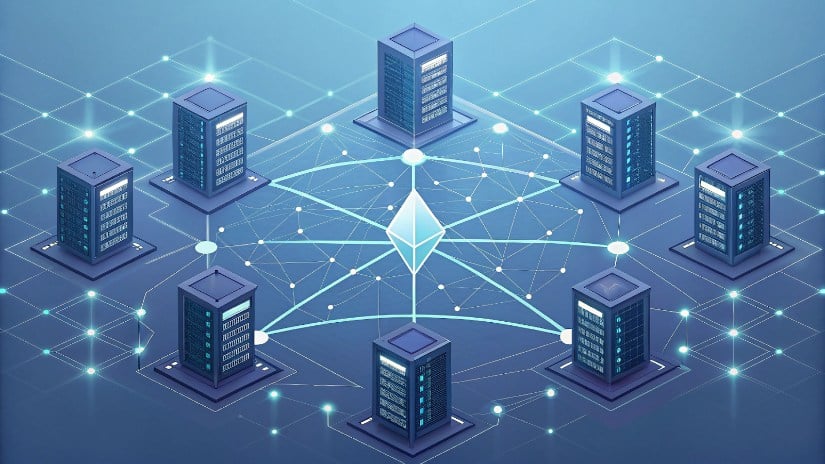South Korea’s largest cryptocurrency exchange has made a significant move into the blockchain infrastructure arena with the introduction of Giwa, a new Ethereum Layer 2 network, announced during the Upbit D Conference 2025. This launch positions Upbit among notable global players like Coinbase and Binance, who have also created their own blockchain platforms.
Giwa, which stands for “Global Infrastructure for Web3 Access,” aims to address key issues that currently hinder Ethereum’s transaction speed. Designed to process blocks every second, the network promises near-instant transactions, a stark contrast to the slower processing capabilities of Ethereum.
One of the standout features of Giwa is its use of Optimistic Rollup technology, built on Optimism’s OP Stack. This allows Giwa to leverage Ethereum’s robust security while significantly enhancing transaction speeds. Early testing results are promising: the Giwa Sepolia testnet has successfully processed over 4 million blocks, demonstrating its capacity for high-frequency operations. Developers are able to transfer their existing Ethereum smart contracts to Giwa with minimal adjustments, thanks to its full support for the Ethereum Virtual Machine.
Moreover, Upbit has equipped its network with comprehensive developer tools, including a block explorer for monitoring testnet activities. This infrastructure enables developers to test applications in a dynamic environment ahead of the main network’s launch.
Upbit holds a commanding position in South Korea’s crypto market, accounting for roughly 73% of trading and facilitating $2.5 billion in daily transaction volume. Although primarily focused on the Korean market, this trading volume places Upbit as the 20th largest exchange globally. Recent reports reveal that South Korea recorded $1 trillion in cryptocurrency purchases from July 2024 to June 2025, making it the second-largest market worldwide, trailing only the United States.
The considerable user base provides Giwa with a strategic advantage. Analysts have highlighted Upbit’s extensive liquidity and user engagement as pivotal factors that could drive the success of this blockchain initiative.
In a twist to the expectation of a regional focus, Upbit’s parent company, Dunamu, is marketing Giwa as a global infrastructure platform. The Giwa Wallet is designed to support multiple blockchains, including Ethereum, Base, Arbitrum, Polygon, and Avalanche. This multi-chain strategy illustrates the company’s aim to foster connections between various blockchain ecosystems rather than limit itself to an isolated framework.
Dunamu also operates subsidiaries across Southeast Asia, which positions it favorably to reach a wider network of developers globally, setting sights on competing with established blockchain hubs in markets like the United States and Singapore.
Giwa introduces unique features aimed at enhancing user experience, such as GIWA ID, utilizing Soulbound Token technology for digital identity verification. These tokens are non-transferable, ensuring a higher level of security for digital identities. By operating as a Layer 2 solution that efficiently handles transactions before confirming them back to Ethereum’s primary network, Giwa directly addresses concerns surrounding Ethereum’s high transaction fees and slow processing times.
Developers are likely to appreciate Giwa’s compatibility with existing Ethereum programming standards, facilitating an easier transition for projects wishing to expand onto this new platform without the additional burden of learning new systems.
As major companies like Google, Stripe, and Sony Group have launched or planned to launch blockchain infrastructures in 2025, Upbit joins a wave of innovation within this space. The historical influence of Korean traders on global crypto markets suggests that if Giwa successfully captures this user base, it could emerge as a formidable player in the Layer 2 ecosystem.
This development symbolizes a transformation for Upbit, transitioning from a mere trading platform to a comprehensive provider of Web3 infrastructure. This strategic pivot is crucial for generating new revenue channels as traditional trading fees face increasing competition.
While Upbit has not disclosed a timeline for the main network’s launch, the current focus remains on refining developer tools and further testing through the Giwa Sepolia testnet. With connections supported for Web3 wallets and contract deployments within the testing environment, developers are already beginning to engage with the new system.
Operating under the oversight of Korean financial authorities, Upbit likely secured necessary regulatory approvals prior to Giwa’s announcement. This support could lend stability to the project as it progresses toward a full-scale launch, especially as early community feedback indicates substantial interest in potential applications and future token offerings.
The introduction of Giwa marks a pivotal moment for South Korea’s aspirations as a global blockchain hub. By merging Upbit’s market dominance with advanced Layer 2 technology, the initiative promises a robust infrastructure poised to serve developers and users on a worldwide scale. The success of Giwa will hinge on its ability to attract a diverse array of projects, uphold technical performance, and cultivate a thriving ecosystem capitalizing on its remarkable one-second block time capability.






